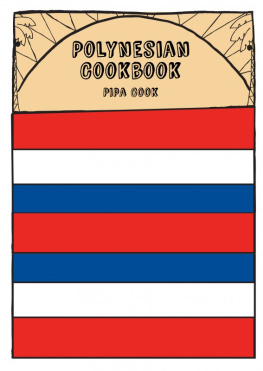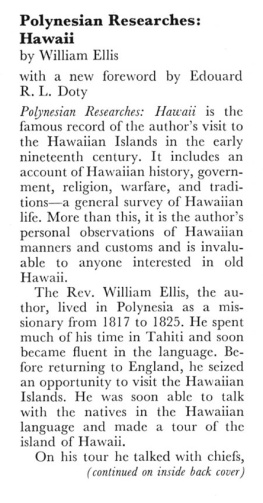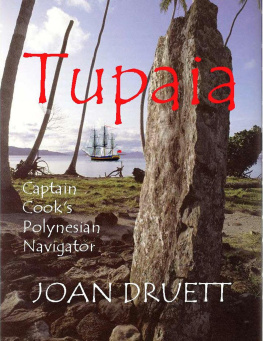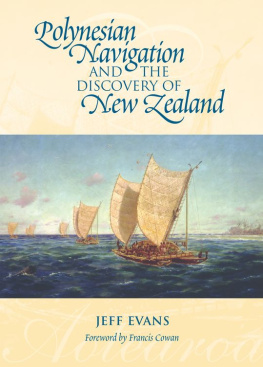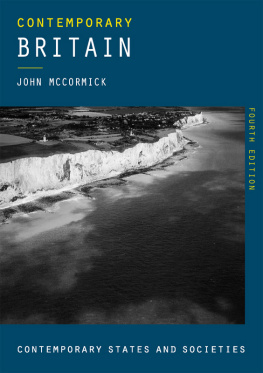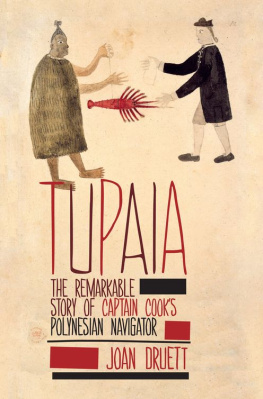
I Omai by Sir Joshua Reynolds, c. 1775
Mai or Omai, as he was known to Europeans, was the first Polynesian to visit Britain. Picked up by one of Cooks captains, he was carried to England where he became a human curiosity and the lion of fashionable London. Under the patronage of Lord Sandwich and Joseph Banks, he was presented at Court, entertained by aristocratic hosts, examined by scientists, celebrated or satirized by poetasters, and painted by a succession of artists. He learned to skate and play chess, he developed a liking for the theatre, he acquired such social polish that he won praise from Dr. Johnson. At the end of two years he was taken back to the Pacific by Cook who left him at the island of Huahine.
Omais story has been told in numerous books and articles. But hitherto there has been no comprehensive study of its background and implications. In what circumstances did this obscure islander reach Britain and why did he create such interest? What were his antecedents and what his subsequent fate? In setting out to answer these and related questions the author has not only created a portrait of Omai but built up a picture of his two worlds, the Polynesian and the European. In addition he has thrown some fresh light on the history of European expansion in the Pacific. All this is woven into a narrative which, as readers would expect from E. H. McCormick, is lucid, elegant, and often witty. The book is based on widespread sources, many previously unpublished, and includes among its illustrations (four in colour) all the known likenesses of Omai. Its publication coincides with the bicentenary of his return to Huahine in 1777.
Omai, Pacific Envoy
OMAI
Pacific Envoy
E. H. McCormick


This volume includes quotations from Boswell for the Defence (1960), ed. W. K. Wimsatt and F. A. Pottle, and Boswell: the Ominous Years (1963), ed. C. Ryskamp and F. A. Pottle. Copyright Yale University. Used with permission of William Heinemann Ltd., London, and McGraw-Hill Book Company, New York.
Publication of this book has been assisted by a
grant from the Minister of Internal Affairs.
E. H. McCormick 1977
First published 1977
This ebook edition 2013
Printed in New Zealand
from typeset by Typocrafters
by the University of Auckland Bindery
Colour plates printed by Wilson and Horton Ltd.
Bound by L. D. Hanratty Ltd.
eISBN 978 1 86940 799 5
To
Keith Sinclair
and
Keith Sorrenson
Friends, Colleagues, Patrons
IN ORIGIN THIS BOOK IS THE BY-PRODUCT OF A STUDY, BEGUN SOME YEARS ago, of James Burney and his circle. After completing a first draft I realized that Omai had received undue emphasis in the early chapters, that he had in effect taken over the enterprise. So, setting aside the typescript (only temporarily, I trust), I decided to undertake a separate work devoted solely to Omai. My aim has been to put him in his setting of place and time, to relate such biographical details as could be ascertained or surmised, and to trace the course of his posthumous reputation both in his native islands and in Europe.
For a man of whose life only a little more than four years are recorded the scale of treatment may seem may well be somewhat disproportionate. But Omai was more than the first Polynesian to visit Britain, more than the amiable buffoon whose How do, King Tosh? and similar fatuities have been quoted in scores of books and articles. As I hope the following pages will show, he was a kind of catalyst, provoking discussion of many issues moral, philosophical, religious concerning eighteenth-century society. In his person, moreover, he dramatized dilemmas which still confront Europeans in their dealings with Pacific peoples. Whatever may be learned from Omais example (and I have left readers to draw their own conclusions), the lessons still seem relevant. Indeed, I see his story re-enacted daily on the streets of Auckland a spectacle that redeems the city from banality and makes it one of the most interesting in the world.
In compiling the book I have used much hitherto unpublished material drawn from libraries in England, Australia, New Zealand, and the United States. My chief sources, however, have been the late J. C. Beagleholes magnificent edition of Captain Cooks journals and the Endeavour journal of Joseph Banks. One of Professor Beagleholes characteristics as an historian and one of his few weaknesses, it seems to me was the intensity of his response to figures of the past. For Omai he apparently felt neither sympathy nor regard: he was really a very foolish inattentive fellow ran a summing up in the introduction to volume iii of Cooks journals (p. lxxxviii); he was at bottom a foolish inattentive fellow was again the verdict in The Life of Captain James Cook (p. 449). In the latter work, to my consternation and for reasons I have failed to discover, the generally accepted Mai was rendered Mae.
Readers must again make up their own minds about Omai or Mai (as I shall continue to call him) from the abundant and often conflicting evidence assembled below. In my opinion, for what it is worth, he acted well in the testing situations into which circumstances and the whims of his patrons led him. And where his conduct was most severely censured by European observers (during the interlude at Tahiti, for example) it could be defended as in accordance with his inherited precepts and customs. One day I hope some writer, perhaps of Polynesian origin, will emulate the Abb Baston and retell the story of Omai from his own point of view.
For a chronicler with no competence in any of the Polynesian tongues there have been some problems. Contrary to the advice of learned friends, in rendering native words I have omitted glottal stops, partly because they are unfamiliar to me, partly because they rarely appear in my sources. The form of personal names has presented further difficulties. Following the style which it seemed natural to adopt for Omai, I have called individuals by the designations used by eighteenth-century explorers and writers (Oberea, Ereti, Otoo) while indicating the probably correct versions in the text. Geographical terms are normally given in their modern forms, though sometimes it seemed appropriate to employ such superseded place names as Van Diemens Land and Batavia. The index with its cross-references should clear up any uncertainties. Quotations, it is hardly necessary to say, are rendered without alteration and, always subject to a small margin for human error, may be assumed to reproduce any peculiarities in the original texts or documents.
Obligations incurred at every stage of the work are many. It has been my good fortune to benefit from the labours not only of J. C. Beaglehole but of others who have contributed to what is surely the golden age of Pacific scholarship. Bernard Smiths European Vision and the South Pacific has again been a guide and inspiration, as it has been ever since I reviewed it for Landfall in March 1961. In dealing with the unfamiliar subject of French exploration I have largely relied on J.-E. Martin-Allanics exhaustive study of Bougainville and J. Dunmores more general survey. In the penultimate chapter I have used D. L. Olivers Ancient Tahitian Society and, had it appeared earlier, would have drawn more often on that superb conspectus of a vanished culture. I have also relied heavily on recent bibliographers of the Pacific, especially P. OReilly and E. Reitman, Miss M. K. Beddie, Miss Phyllis Mander-Jones, ana R. E. Du Rietz.
Next page




